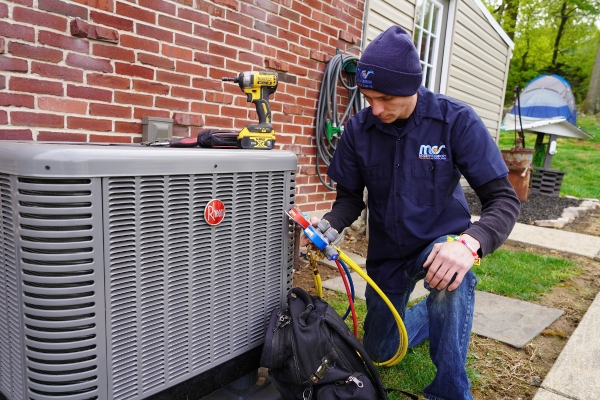Page Contents
Understanding the conditions that foster mold growth is crucial. The U.S. Environmental Protection Agency highlights three essential factors in mold development: moisture, a food source, and oxygen. This reality indicates that almost any moist spot in your home is a potential breeding ground for air conditioner mold.
The presence of air conditioner mold is concerning because it can spread rapidly throughout your home, posing significant health risks to pets and people. To protect the well-being of your household, it’s vital to engage a qualified HVAC expert, like Modern Comfort, to check your air conditioning system regularly, ensuring it remains mold-free and your living space is safe and comfortable.
Best Ways to Prevent Air Conditioner Mold

Preventing mold in your air conditioning unit is not just about avoiding health risks; it also shields you from potentially hefty repair bills. It’s essential to recognize that home insurance often does not cover mold damage unless it directly results from a covered incident, such as appliance-related flooding. Preventing mold in your air conditioner is a matter of health and financial prudence. The following sections explore the importance of maintaining a mold-free air conditioning system and provide practical prevention tips.
Don’t wait for mold to become a problem in your air conditioner. Book a professional inspection and cleaning today to safeguard your home and your family’s health. Call Modern Comfort today!
Why Air Conditioner Mold is Dangerous
Medical News Today highlights that while mold in the home isn’t always a dire threat, its impact on health is not to be underestimated, mainly when it concerns the respiratory system. Mold exposure can result in various health issues, from allergic reactions and breathing difficulties to severe conditions such as aspergillosis.
The situation worsens when mold takes root in air conditioners, as these systems can quickly distribute harmful spores throughout your living space. Furthermore, mold risks the air conditioner itself, damaging electrical components, diminishing efficiency, and potentially necessitating expensive repairs or replacements.
Signs of Mold in Your Air Conditioner

Awareness of mold’s health risks is crucial, necessitating vigilance for signs that it may be infiltrating your air conditioning system. This issue is further complicated because mold spores are microscopic, remaining invisible until they accumulate into larger colonies.
For reliable detection of mold in your AC, its ventilation system, or any area of your home, seeking the expertise of a professional HVAC contractor is recommended. Considering this, it’s crucial to know particular signs that indicate mold growth within your air conditioning system.
Top Air Conditioner Mold Growth Signs:
- Musty Air Condition Smell: This is frequently the first and most evident indicator of mold or mildew within your air conditioner. An unexplained musty smell in your home often points directly to mold growth in the system.
- Visible Mold Signs: While mold may start microscopic, it becomes visibly noticeable as it matures and produces spores. These spores appear in a range of colors—black, grey, white, green, red, orange, brown, and purple—depending on environmental conditions such as moisture, light, and nutrient availability. These color variations allow mold to be detectable by the naked eye.
- Increased Room Humidity: An unexpected increase in your home’s humidity levels while the air conditioner operates could indicate mold within the system. Air conditioners are designed to cool the air and reduce humidity. If mold hinders the system’s ability to function correctly, you might notice higher-than-usual indoor humidity levels.
- Arise Of Health Issues: The onset of sudden illnesses among your family members or pets when the air conditioner is running could indicate mold contamination. Symptoms linked with mold exposure include sneezing, coughing, watery eyes, wheezing, nasal congestion, itchy skin, and various allergic reactions. For individuals with asthma, these symptoms can be even more acute and severe.
Ensure your home’s indoor air quality remains clean! Our dedicated HVAC professionals can help you regularly clean and maintain your home cooling system. Call Modern Comfort now!
How to Remove Mold From Your Air Conditioner
Due to the intricate nature of mold removal and its significant health risks, it is essential to delegate this task to a certified and experienced HVAC professional. Professionals in the HVAC field are uniquely equipped with the expertise and tools necessary to safely and effectively resolve mold issues within air conditioning systems. The following outlines the typical steps an HVAC expert may undertake to eliminate mold from your air conditioning system:
- AC Unit Inspection: The contractor starts with a detailed air conditioning unit and ductwork inspection to locate mold growth.
- Assessment Of Your Cooling System: Next, the severity of the mold infestation is evaluated to formulate an effective remediation strategy.
- Mold Containment: Measures are then implemented to prevent mold spores from spreading during removal.
- Air Filtration: Air scrubbers and HEPA filters trap airborne mold spores, purifying the air.
- Removal of Mold Growth: Mold is removed from the air conditioner and ducts using specialized cleaners and tools to eliminate all traces.
- Mold Development Prevention: After cleaning, suggestions for preventing mold recurrence include enhancing ventilation, repairing leaks, or setting up a dehumidifier.
- HVAC Maintenance: Regular HVAC system upkeep is recommended to ensure efficiency and prevent mold growth.
Engaging a professional HVAC contractor for thorough inspection, cleaning, and maintenance of your air conditioning ensures effective mold removal and prevention, protecting your home’s air quality and your family’s health.
Tips to Prevent Air Conditioner Mold

Catching mold in your air conditioner usually indicates a significant problem, possibly with damage incurred. Hence, preemptive action is critical to dodging the issues mold brings. Regular tune-ups by a professional HVAC contractor are paramount for keeping your system clear of mold. To protect your air conditioning from mold, an experienced HVAC professional will carry out several vital maintenance procedures:
- Disinfecting the AC: To maintain a healthy air system, disinfecting the air conditioner, ducts, and ventilation parts is essential to remove mold and other harmful microbes. An HVAC professional will employ EPA-approved disinfectants to ensure thorough cleaning.
- Cleaning & Replacing HVAC Filters: Regular filter maintenance is critical for optimal air quality. The U.S. Department of Energy advises cleaning the AC filter bi-weekly, especially in areas with high pollution, and replacing it every 45 to 90 days. An experienced HVAC contractor is ideal for managing these tasks effectively.
- Mold Inhibitor Application: A mold inhibitor is a preventive measure that involves applying a chemical solution specifically formulated to hinder the growth of mold and mildew.
- Keeping Air Ducts Dry: Moisture in air ducts sets the stage for mold and mildew. An HVAC contractor can ensure duct dryness through comprehensive cleaning, repairing any issues, and replacing water-damaged parts to prevent mold formation.
- Installing a UV Light: Installing UV light in your air conditioning system offers a robust defense against microbes, effectively preventing mold growth by neutralizing various microorganisms.
Enhance your home’s safety and comfort with Modern Comfort’s reliable heating and cooling solutions enhance your home’s safety and comfort. Contact us today for a personalized service consultation.
Conclusion
Mold in air conditioners threatens the structural health of your home and the well-being of its residents. To protect your living space and ensure your family’s health, it is vital to enlist a reputable HVAC technician for regular inspections and cleanings of your AC unit. Furthermore, a certified HVAC professional can offer expert guidance on preventive measures against mold infestation, helping to maintain your home as a secure and healthy environment.
Contact Modern Comfort for Expert Air Conditioning Services
At Modern Comfort, excellence in heating and cooling services is our hallmark, serving Central Maryland and Southern and Central Pennsylvania with pride. Our team consists of exceptionally skilled and professionally certified technicians committed to ensuring your HVAC system’s optimal performance through expert tune-ups, repairs, installations, and replacements. With a wealth of knowledge and experience, they guarantee your system’s efficiency and reliability.
Modern Comfort is dedicated to providing top-quality heating and cooling services at the most affordable rates in the area. Our extensive maintenance programs are designed to maximize your comfort, improve energy efficiency, and reduce your household’s cooling costs. Whether you need an HVAC repair or are considering a system upgrade, we offer tailored solutions that meet your specific requirements and budget.
We back our services with a strong satisfaction guarantee, ensuring peace of mind. For a professional air conditioner tune-up or service consultation, contact Modern Comfort today. Free in-home estimates are available.
You can click here to contact us now or call us at (410) 429-7252 (MD residents) and (717) 489-3939 (PA residents) to find out more! Click the link to view our service area.

Related Articles:

Recent Articles